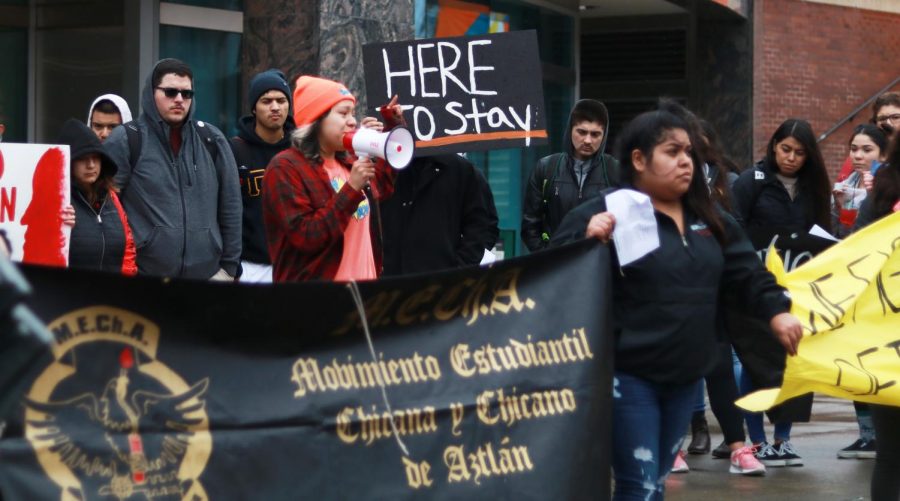DREAMers help community evolve
DACA recipients bring economic improvements, diversity despite myths of increased violence, cultural conflict
OLIVER MCKENNA | DAILY EVERGREEN FILE
DACA recipient Brenda Rodriguez leads a rally to show support of the Clean DREAM Act. DACA recipients must constantly fight back against numerous rumors and stereotypes regarding their status.
February 27, 2018
Maximiliano Madrigal is a student of science. Though only a freshman at WSU, Madrigal is working with the goal of a doctorate in his future.
But his dream is restricted. You see, Madrigal is a Deferred Action for Childhood Arrivals recipient.
DACA was created out of a demand for support for undocumented children. Though it happened in Obama’s presidency, it was the DREAMers who deserve credit for the legislation, as they were the boots on the ground pushing for support.
The idea of the Clean DREAM Act, and the concept of DACA, is something foreign to many of us.
“A lot of people … don’t have an opinion at all because they don’t know,” Madrigal said.
One of the many debates surrounding DACA involves the crime rate. Some argue that immigration increases crime rate when, in reality, numerous studies have found otherwise.
According to a 2017 study by The Cato Institute, “despite individual news stories and anecdotes to the contrary, DREAMers are less crime prone than native-born Americans.” They also conclude that “the native-born incarceration rate is 14 percent higher than the DREAMer incarceration rate.”
Not only that, but children are unable to receive DACA if they have any criminal background. This includes any possibility of gang membership or if they are deemed a threat to public safety.
“DACA recipients go through an intense background check,” senior DACA recipient Brenda Rodriguez said. “We are already in the system; we are already cleared.”
In addition to DACA, numerous states have adopted a sanctuary status in an attempt to protect those with illegal immigrant status.
“[Currently] sanctuary states mean nothing,” Rodriguez said. “We still have people with DACA being detained.”
Washington is a sanctuary state, but that doesn’t mean as much as you think. It indicates that police will not get involved in DREAMers’ affairs, and they will not interfere with any federal actions against them.
“Contact with law enforcement makes me nervous,” Madrigal said. “Even if I don’t commit a crime, I’m still put on the [Immigration and Customs Enforcement] radar.”
According to a study by the American Sociological Review, neighborhood violence decreases with immigration due to “enhancing trust and public social control within immigrant neighborhoods.” On top of this, cultural diversity increases with immigration due to the introductions of new traditions and ideas into society.
The DACA program also has the potential to put the U.S. at an advantage economically and socially. According to the National Academies of Sciences, Engineering and Medicine, immigration to the U.S. has produced net benefits worth $50 billion a year.
With his DACA status, Madrigal’s doctorate is a bit further out of reach. Without the ability to gain federal financial aid, such as FAFSA, the cost of a higher degree is enormous.
All DACA students run into this issue, and most of the time it comes as a reality check.
“I knew I was going to college my sophomore year of high school,” DACA student Celeste Estrada said. “I didn’t think that my status was going to prevent me from doing so.”
Right now, DACA students turn to scholarships like College Bound or those that do not require legal citizenship — which are few — and the state-instituted Washington Application for State Financial Aid, which was created out of the state’s own DREAM Act.
“We don’t qualify for many scholarships,” Madrigal said. “We always have to check to see if it’s U.S. citizens only. It would be more difficult to obtain even graduate degrees if the DREAM Act wasn’t passed.”
WSU has stepped up in helping these DREAMers. The school offers resources and even eliminated mandatory dorms for freshmen DACA students to help reduce the cost of schooling. But even WSU can only do so much.
Rodriguez said study abroad was one of the biggest opportunities that is restricted for DACA students, especially for Spanish majors like herself who are required to study abroad for their degree. Estrada also had an opportunity to study outside the U.S., but was unable to do so.
“I couldn’t obtain experience for my major because DACA closed the door for study abroad,” Estrada said. If she took advantage of the opportunity, even with the support of the school, her status would prevent her from returning to the U.S. and would leave her stranded.
To allow these individuals to gain a proper foothold in society, the Clean DREAM Act will grant illegal immigrants a pathway to citizenship with an official residency in our country and full opportunities, as they were given to generations of immigrants before us.
Despite most of our grandparents and great-grandparents emigrating from Europe, America is very uncomfortable with immigration. After winning independence, America was so worried about falling under outside influence that it became isolationist.
We adopted the philosophy of excessive territorialism as the definition of being an American — that defending ourselves against whatever is “other” allows us protection. We fight instead of unite. We deny instead of understand. And this has been our choice from the beginning.
If we remove these immigrants from our society, it will be detrimental for both sides. And we need to know our facts before we damn each other — this is the curse of our present society. We need to educate ourselves and foster open minds.





















